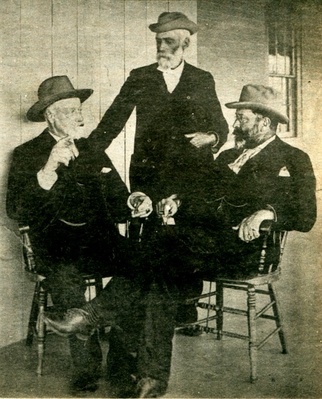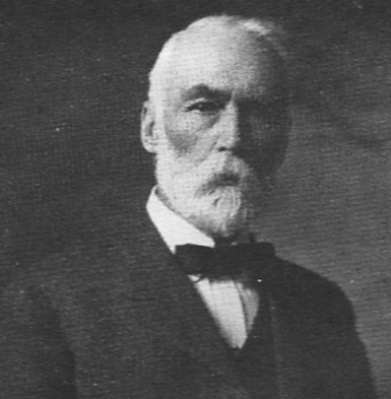 Paul Smith, D.W. Riddle, Dr. Samuel B. Ward, undated. Adirondack Daily Enterprise, April 25, 1987
Paul Smith, D.W. Riddle, Dr. Samuel B. Ward, undated. Adirondack Daily Enterprise, April 25, 1987  Daniel W. Riddle
Daniel W. Riddle
Died: June 8, 1913, at the Riddle Cottage in Saranac Inn. He is buried in Bedford, New Hampshire.
Married: Genevra Howe
Children: George D. Riddle, and a daughter, Blanch
Daniel Wiltshire Riddle was a Civil War veteran. He came to Saranac Lake in February, 1879, age 46, as a patient of Dr. E. L. Trudeau. He remained 34 years. His obituary in the Adirondack Daily Enterprise stated, "He continued to make Saranac Lake his winter home, slept under canvas during the summer, as a part of the cure, and was carried from camp to Saranac Lake, or visa versa, on a bed." When Dr. Trudeau founded his Sanitarium in 1884, Riddle, an experienced businessman, helped Trudeau by becoming the sanatorium’s treasurer. He kept the books, made reports, and helped keep the fledgling sanatorium on a sound financial basis when it was struggling, and he set up an endowment fund. Trudeau wrote of their strong friendship over the years. 1
In 1886 he became manager at the new Saranac Inn.
He built a house at 68 Franklin Avenue (now 8 Franklin Avenue) between 1899 and 1900. He devised a system whereby the water from Lake Flower was pumped to a storage tank atop Helen Street Hill where gravity could take over to supply a steady flow. 2
Chateaugay Record and Franklin County Democrat, June 13, 1913
WELL KNOWN HOTELMAN DEAD
Active Career of Business Man and Health Seeker Ended—Treasurer of the Adirondack Cottage Sanitarium Since Its Inception—Experiences During Civil War.
Daniel W. Riddle, for more than twenty-five years identified with Saranac Inn as Manager or Superintendent of its properties and treasurer of the Adirondack Cottage Sanitarium at Trudeau, near Saranac Lake, since its inception, died on Sunday night at his summer cottage near Saranac Inn on the Upper Saranac Lake. His death ends an unusually active career, all the more remarkable because he was compelled to seek the mountains in search of health thirty years ago. He had held many offices of trust which he filled with satisfaction and distinction.
Mr. Riddle went to the Adirondacks about thirty years ago because of his health, and he was associated with. Dr. E. L. Trudeau of Saranac in founding the Adirondack Cottage Sanitarium, of which he had been its first and only treasurer. Upon his arrival in Saranac Lake Mr. Riddle at once took part in the activities of the village. He laid the first (wooden) water pipes for the village water system. Later he took the management of Saranac Inn on the Upper Saranac Lake, and since relinquishing that position had remained in charge of the Inn, properties and large real estate holdings. At the outbreak of the Civil War Mr. Riddle was in the South on a collecting tour for a Philadelphia business house, and he found himself with a large sum of money on his person and on the wrong side of the lines. He had many exciting experiences in getting to the North, but he arrived safely with the money intact. He fought in the Civil War, being in the naval service, and was a member of the Loyal Legion. He is survived by his wife, one son, George D. Riddle, and a daughter.
New York Times, September 4, 1886.
THE PRESIDENT'S LUCK
HE BRINGS DOWN A DEER DURING HIS HUNTING TRIP.
SARANAC INN, New-York, Sept. 3. — After an absence of four days, President Cleveland and party returned to Saranac to-night. They had a most enjoyable time on the Tupper Lakes. Each man had his deer, and everybody was exceedingly pleased. Proprietor Daniel W. Riddle abandoned the business of managing his hotel long enough to take charge of the engine of the launch Nellie and ran her down the lake to Sweeny's Carry, where the President's party was taken aboard. It was dusk when the Nellie was sighted turning the point of Dry Island. In the afternoon some of the guests at the hotel had made arrangements for the firing of a presidential salute on the arrival of Mr. Cleveland. After a long consultation it was decided that such a salute consisted in the firing of 21 guns and the dipping of the American flag three times. This salute was accordingly given as the Nellie neared the landing, Winchester rifles being substituted for smooth-bore cannons and a hotel clerk for a sailor at the halyards.
Mrs. Cleveland and her mother, Mrs. Folsom, enjoyed during their absence an experience such as had never been theirs before. They had been transported into the heart of the wilderness in small boats, and had lived for three days at Pliny Robbins's, a celebrated retreat on Little Tupper Lake, frequented by those who rough it for the love of hunting. In reaching that spot, a long carry, many miles in an open boat had to be overcome. A heavy storm overtook the party, and they were well drenched at the end of the first day's journey into the wilderness. The following day, which was Tuesday, saw them at Pliny's, and the day after that the pack of hounds was loosed. President Cleveland took his stand on Round Pond. Henry W. Brown, of Philadelphia, was stationed at Clear Pond. Dr. Ward took the runway at the rapids of Little Clear Stream, while Col. Belo, of the Galveston News, got a station on Two Island Bay, on the Big Tupper. Mr. Cleveland shot his deer through the neck. It proved to be a fine, fat buck— a four-pronged buck, so called from the spread of his antlers. The head and antlers will in time adorn the walls of the President's country seat near Washington. Mr. Cleveland was much pleased with his good luck, and he laughingly received the congratulations of his friends.
To-night the President listened with astonishment and sincere regret to the newspaper accounts of the ruin and suffering at Charleston which were read to him.
G.T. Ridlon, History of the ancient Ryedales and their descendants in Normandy, Great Britain, Ireland, and America, from 860 to 1884., 1884 p. 236 (http://openlibrary.org/books/OL7128509M/History_of_the_ancient_Ryedales Full text])
Daniel-Wiltshire Riddle4 (2), fourth son of William3 (3), was born in Bedford. N. H., July 12, 1833; married Jan. 28, 1872, Jennie Howe, of Waterloo, N. Y., and has issue. He was engaged in business in Baltimore when the war of the Rebellion broke out; volunteered into the Union service, and joined the First Philadelphia Troop, which was stationed at Winchester, Va. After his term of service had expired, he received the appointment of assistant paymaster in the navy. He was in the blockade service of the Gulf and about New Orleans; was on board Admiral Farragut's flag-ship at the naval battle off Mobile, and practically served through the war. After the close of the war, he engaged in business at New Orleans, where he continued for a time, and subsequently returned to his native town, and is now (1876) living on the homestead place.
Comments
Footnotes
1. Trudeau, Edward Livingston, M.D., An Autobiography. Garden City, N.Y.: Doubleday, Doran & Company, Inc., reprint 1934. Originally published 1915.
2. Adirondack Daily Enterprise, August 31, 1994



